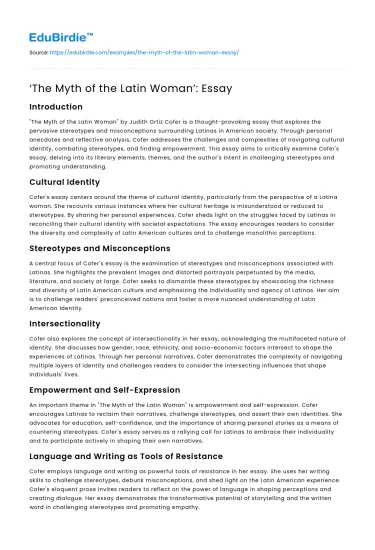Introduction
"The Myth of the Latin Woman" by Judith Ortiz Cofer is a thought-provoking essay that explores the pervasive stereotypes and misconceptions surrounding Latinas in American society. Through personal anecdotes and reflective analysis, Cofer addresses the challenges and complexities of navigating cultural identity, combating stereotypes, and finding empowerment. This essay aims to critically examine Cofer's essay, delving into its literary elements, themes, and the author's intent in challenging stereotypes and promoting understanding.
Cultural Identity
Cofer's essay centers around the theme of cultural identity, particularly from the perspective of a Latina woman. She recounts various instances where her cultural heritage is misunderstood or reduced to stereotypes. By sharing her personal experiences, Cofer sheds light on the struggles faced by Latinas in reconciling their cultural identity with societal expectations. The essay encourages readers to consider the diversity and complexity of Latin American cultures and to challenge monolithic perceptions.
Save your time!
We can take care of your essay
- Proper editing and formatting
- Free revision, title page, and bibliography
- Flexible prices and money-back guarantee
Stereotypes and Misconceptions
A central focus of Cofer's essay is the examination of stereotypes and misconceptions associated with Latinas. She highlights the prevalent images and distorted portrayals perpetuated by the media, literature, and society at large. Cofer seeks to dismantle these stereotypes by showcasing the richness and diversity of Latin American culture and emphasizing the individuality and agency of Latinas. Her aim is to challenge readers' preconceived notions and foster a more nuanced understanding of Latin American identity.
Intersectionality
Cofer also explores the concept of intersectionality in her essay, acknowledging the multifaceted nature of identity. She discusses how gender, race, ethnicity, and socio-economic factors intersect to shape the experiences of Latinas. Through her personal narratives, Cofer demonstrates the complexity of navigating multiple layers of identity and challenges readers to consider the intersecting influences that shape individuals' lives.
Empowerment and Self-Expression
An important theme in "The Myth of the Latin Woman" is empowerment and self-expression. Cofer encourages Latinas to reclaim their narratives, challenge stereotypes, and assert their own identities. She advocates for education, self-confidence, and the importance of sharing personal stories as a means of countering stereotypes. Cofer's essay serves as a rallying call for Latinas to embrace their individuality and to participate actively in shaping their own narratives.
Language and Writing as Tools of Resistance
Cofer employs language and writing as powerful tools of resistance in her essay. She uses her writing skills to challenge stereotypes, debunk misconceptions, and shed light on the Latin American experience. Cofer's eloquent prose invites readers to reflect on the power of language in shaping perceptions and creating dialogue. Her essay demonstrates the transformative potential of storytelling and the written word in challenging stereotypes and promoting empathy.
Conclusion
"The Myth of the Latin Woman" by Judith Ortiz Cofer is a significant literary piece that challenges stereotypes, explores cultural identity, and promotes understanding. Through personal anecdotes, Cofer dismantles misconceptions about Latinas, highlights the complexity of cultural identity, and encourages readers to embrace diversity. Her essay serves as a call to action, urging Latinas to reclaim their narratives and assert their individuality. Cofer's work is a reminder of the importance of challenging stereotypes and fostering empathy, ultimately promoting a more inclusive and culturally diverse society.






 Stuck on your essay?
Stuck on your essay?

